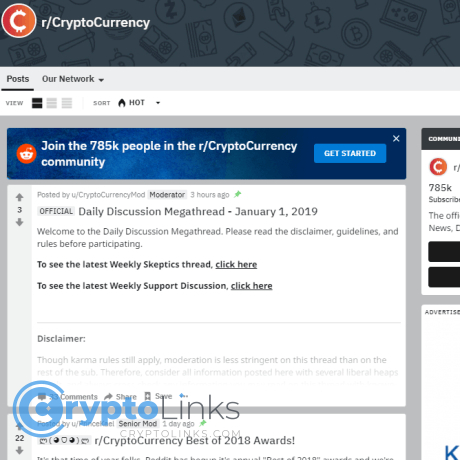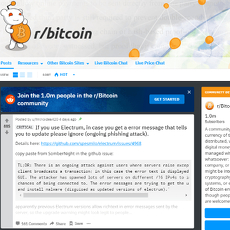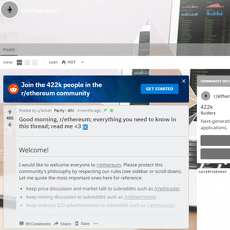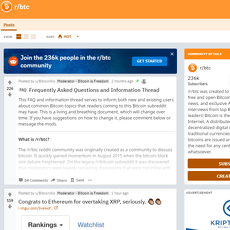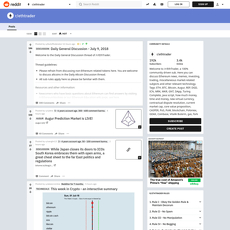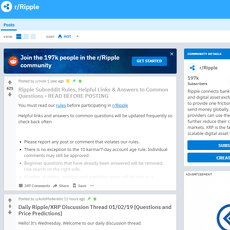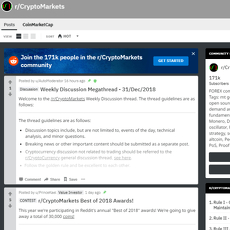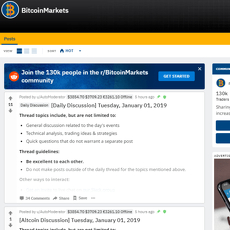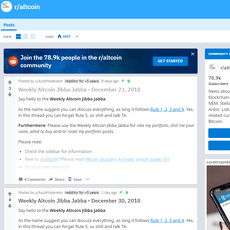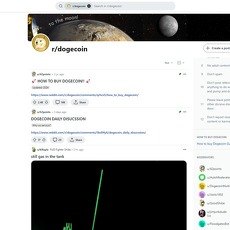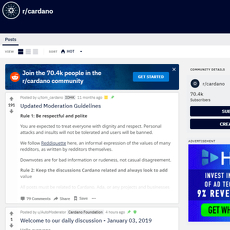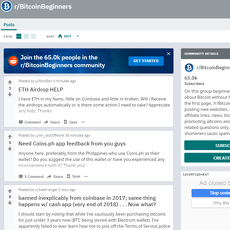r/CryptoCurrency Review
r/CryptoCurrency
www.reddit.com
r/CryptoCurrency Reddit Review Guide: How to use the biggest crypto forum without getting wrecked
Ever open r/CryptoCurrency, see a hundred hot takes, and wonder, “Is any of this actually useful—or am I about to get shilled into oblivion?”
That feeling is normal. The sub is massive, fast, and full of people with different goals: some want to help, some want karma, and some want your attention right before a token pops and drops. The good news: with the right habits, you can use the largest crypto forum on Reddit to learn faster, spot better info, and keep your account—and your wallet—out of trouble.
The problem most people run into
r/CryptoCurrency is a firehose. Newbies and veterans get hit with the same mess of memes, moon calls, and half-baked charts. A few common pain points I hear all the time:
- Speed vs. signal: By the time you read a “breaking” post, three rebuttals and a correction might be buried 40 comments down.
- Conflicting advice: One thread swears a token is the “next SOL,” another calls it a rug, and both have upvotes.
- Automod whiplash: Your post gets removed and you don’t know why. Was it flair? A link? A rule you didn’t see?
- Moons, flairs, daily threads: You hear about Moons (the community token), AMAs, and “DD” flairs—but which of these actually matter?
- Income promises: “Make $1,000 a day trading” posts and comments pop up in every bull run. Spoiler: the risk behind those claims rarely gets highlighted.
None of this is unique to crypto. Social platforms amplify attention, not necessarily accuracy. Research on attention-driven trading shows that crowd focus can push people toward the loudest ideas, not the best ones (Barber & Odean, Journal of Finance). And Reddit isn’t just memes—about a third of Reddit users say they regularly get news there (Pew Research). That mix of speed and belief is powerful—for better and for worse.
Real examples I’ve seen: “Audit incoming” with no auditor named. “Doxxed team” where the LinkedIn profiles were made last week. A chart predicting 10x with no timeframe or volume. Upvotes don’t turn those into facts.
What you’ll get here
I’ll show you how to turn r/CryptoCurrency from a time sink into a smart feed. We’ll map what to read and what to skip, how to verify claims fast, and the parts of the sub that actually deliver value—AMAs, daily threads, and specific flairs. I’ll also share how to keep your posts from getting removed and how to keep your account clean so you can actually participate.
To make this practical, I’m giving you a simple checklist you can use the next time a thread tempts you to click “Buy.” Keep it handy:
- Source first: Open the link and look for primary docs (whitepaper, GitHub, audit, explorer). No primary? Treat as opinion.
- Date check: Is the info current? Old roadmaps and dead token contracts still get pushed.
- Comments scan: Read the top critical replies. Facts with citations beat “feels bullish.”
- Flair filter: “DD/Research,” “Security,” and “Dev/Tech” flairs usually carry more substance than “Meme” or “Opinion.”
- Account tells: New accounts repeating the same pitch across threads = red flag.
Why this matters now
When the market heats up, low-effort hype multiplies. You’ll see coordinated pushes at weird hours, recycled narratives, and price-chasing framed as “alpha.” On the flip side, some of the best learning on the internet sits in r/CryptoCurrency—AMAs with credible teams, security post‑mortems that actually teach you how exploits worked, and daily Q&A threads where smart people explain tax, wallets, and risk management in plain English.
Use the sub for what it’s great at: speed, sentiment, and real-time crowd checks. But always back any decision with your own verification. As one seasoned mod once summarized it in a sticky thread: “Upvotes show interest, not truth.”
What we’re going to cover next
Here’s the game plan so you always know where to look and what to ignore:
- Who r/CryptoCurrency is best for (and who should use slower, smaller subs)
- How to navigate threads and avoid shills without missing real news
- Moons, AMAs, and weekly staples that are actually useful
- Tools and resources to verify claims in under two minutes
- FAQs you keep seeing: $1,000/day, $100/day, “next to explode,” and the 30‑day rule
Ready to make r/CryptoCurrency work for you instead of against you? Up next, I’ll explain what the sub actually is today—and why it still matters even if you’re already deep into crypto. Curious where the real value hides?
What r/CryptoCurrency is (and why it still matters)
The quick take
r/CryptoCurrency is Reddit’s biggest general crypto forum—a 24/7, global stream of breaking news, hot narratives, market takes, and community learning. It’s fast, sometimes messy, often noisy, and still one of the best places to feel what the crowd is thinking in real time.
“In crypto, speed is alpha—context is survival.”
Why that matters: research and markets tend to move with attention. Multiple studies have shown that social attention and sentiment often track near-term crypto volatility and volume (correlation, not destiny):
- Bitcoin price and activity show two-way links with online attention, including search and wiki traffic (Kristoufek, PLOS ONE).
- Social media attention can predict short-term Bitcoin value changes and trading volume (Mai et al., Journal of Management Information Systems).
When major events hit—ETF headlines, exchange outages, DeFi exploits—the first credible hints often show up in the sub within minutes. You’ll get speed, a wide set of viewpoints, and on a good day, crowd-sourced fact-checking that saves you from chasing bad info.
Who it’s for
Not everyone loves a firehose. Here’s how I frame it:
- Curious investors and learners: Great for catching narratives early (L2 adoption, restaking, inscriptions, airdrops) and asking targeted questions.
- Builders and researchers: Useful for sentiment checks, user pain points, and “what the community is actually talking about.”
- Active traders: Good for gauging heat around tokens, catalysts, and event-driven risk. You’ll still need your own system—this isn’t a signals group.
- If you prefer long-form analysis only: You may be happier in smaller, topic-focused subs and newsletters, then use r/CryptoCurrency as a pulse check.
Translation: if you want real-time context and you’re willing to filter, it’s a net positive. If you hate fast threads, it can feel loud. That’s normal.
Core features that actually matter
You’ll see a lot of moving parts. These are the ones that shape your experience:
- Post flairs: Threads are labeled (e.g., News, DD/Research, Security, Dev/Tech, Discussion, Meme, Question). Flairs help you skim for signal. A “News” post with a primary source beats a screenshot 10/10.
- Daily/weekly megathreads: Central hubs for timely Q&A and market talk. On high-impact days (CPI, Fed, major launches), the sub pins special threads to reduce spam and keep updates in one place.
- AMAs: Teams, auditors, wallets, researchers show up to answer questions. The best ones link to audits, on-chain addresses, or repos—great for verifying claims later.
- Moons (community token): Earned for quality contributions and used for tipping and certain governance features. Details evolve, so check the live rules and latest Moons wiki before you plan around them.
- Rules, karma, and Automod: The sidebar and wiki explain posting etiquette, karma requirements, sourcing expectations, and what triggers removals. Skimming these once saves you from “Why was my post removed?” headaches.
Real example of why this helps: during a big exploit, the first reliable threads usually carry Security flair, link to a reputable write-up or the chain explorer, and get quick mod attention. That filter alone often separates actionable updates from viral noise.
Why it still matters (even if you’re jaded)
I get it—after a cycle or two, “next SOL” and “this time is different” gets old. But the sub keeps its edge for three reasons:
- Scale: With millions of members across time zones, you get near-continuous coverage of catalysts, bugs, listings, outages, and AMAs. Speed plus redundancy means fewer blind spots.
- Collective memory: Old AMAs, post‑mortems, and DD threads get resurfaced when relevant. That history is gold when a narrative returns under a new name.
- Open skepticism: For every hype post, there’s usually a top comment poking holes. When pushback links to code, audits, or on-chain data, it can save you money—and stress.
Is it perfect? No. It can reward confident-sounding takes and recycle the same bull cases. But with the right filters (we’ll get to those next), it’s a strong real-time complement to slower, deeper research.
Related places you’ll want on your radar
Think of r/CryptoCurrency as the busy town square. These spots are nearby, each with its own vibe:
- r/CryptoCurrencyMeta — Mod decisions, rule clarifications, Moons governance talk.
- r/Bitcoin — Bitcoin-first focus, policy, mining, upgrades, and culture.
- r/ethfinance — Long-form, thoughtful ETH and Ethereum ecosystem discussion.
- r/CryptoMarkets — Trading-centric: setups, indicators, risk, and market structure.
- r/Buttcoin — Skeptics and critiques; useful to pressure-test assumptions.
- Project subs (e.g., a specific L2, wallet, or DeFi protocol) — Best for release notes, dev updates, and user issues in one ecosystem.
On big news days, I’ll keep r/CryptoCurrency open for the pulse, then jump to r/ethfinance or a project sub to read detail and follow dev comments. It’s a simple way to balance speed with substance.
Feeling the FOMO and the noise already? You’re not alone. The trick is knowing exactly where to look and what to ignore. Want a simple, repeatable way to find the good stuff in seconds—without getting your post removed or your time wasted?
Next up: I’ll show you how I sort, search, and use the daily threads to pull signal from the chaos—fast.
How to navigate like a pro (and actually find signal)
Sorting and search: use the feed like a radar, not a slot machine
New is your real-time scanner. I keep it open during macro prints, exchange incidents, and big launches. You’ll catch early threads before they explode—but early takes are often wrong. A Science paper by Muchnik, Aral, and Taylor showed that a single early upvote on a news item can create a lasting bandwagon effect. Translation: first impressions snowball, so verify before you react.
Top (Past 24h/Week) is where I sanity-check consensus. If something is still top after a day or a week, it usually has sources, context, and pushback in the comments. It’s my “best-of” pass before I save anything for later research.
Controversial is my debate lens. It surfaces split-vote threads—useful for stress-testing a narrative, catching blind spots, and seeing both bull and bear arguments in one place.
Rising is the early momentum feed. I scan it to spot narratives that are about to dominate the Daily Discussion or get their own megathread.
Smart search strings that actually work
- On Reddit search in the sub: flair_name:"DD/Research" ethereum (swap “ethereum” for any project) to surface higher-effort posts.
- Use Google for better recall: site:reddit.com/r/CryptoCurrency AMA ledger, site:reddit.com/r/CryptoCurrency "Daily Discussion" CPI.
- Time-filter everything (Past month/Year). Crypto ages in dog years; last cycle’s “alpha” can be today’s risk.
“The goal isn’t to be early. The goal is to be right.”
Daily/weekly threads: the sub’s heartbeat (don’t post against the tide)
The Daily Discussion is where live Q&A, quick takes, and market color actually get seen. Big days—Earnings, CPI, FOMC/Fed decisions, major mainnet launches—usually have pinned megathreads. I always check the top two pinned posts before submitting anything. If your post belongs in a megathread and you ignore it, AutoMod will nuke it and you’ll wonder why it vanished.
Example workflow on a CPI morning
- Open r/CryptoCurrency sorted by New and note the two pinned megathreads.
- Skim the CPI megathread for the release, compare the first few summaries, and look for links to BLS or a reputable newsroom.
- Flip to Top (Past 24h) to see which previews or explainers aged well and didn’t get corrected.
- Hop into Controversial to gauge how divided the read is (sticky inflation? “risk-on” only?).
Posting without getting removed: pass the gatekeepers on the first try
Moderation here is strict, and the rules are written right into the flair system. I stick to this checklist:
- Pick the right flair (News, Discussion, Question, DD/Research, Security, etc.). If you’re unsure, choose Discussion—then adjust if AutoMod prompts you.
- Link to a primary source whenever possible (official docs, GitHub, audit PDFs, chain explorers). Add a one‑sentence summary at the top.
- No referral codes or affiliate links. If you wrote the analysis, say so plainly: “Original research; no ads/refs.”
- Check pinned megathreads first. If your post fits a megathread’s scope, put it there.
- Read the AutoMod message if removed. It explains the rule and includes a link to contact mods. Reply to that message with a concise correction or context if it was a mistake.
Templates that avoid auto-removal
- News: “[Source] Headline — 2-sentence summary + 1 primary link + 1 supporting link (official blog or doc).”
- Question: “Specific question + your current understanding in 2 bullets + what you’ve already checked (docs/FAQ).”
- DD/Research: “Thesis + methods (on-chain/data sources) + risks + sources list. No price targets.”
Comment karma basics: earn it by making other readers faster
Karma comes from saving people time. I aim to be early, useful, and sourced:
- Post a TL;DR when a long article drops. 3 bullets max, each with a timestamp or quote and a link.
- Answer questions with receipts (docs, explorers, reputable outlets). “Because I said so” gets buried.
- Stay away from one-liners (“When moon,” “bullish af”). They get filtered mentally and by the algorithm.
- Format helps: short paragraphs, bullet points, bold labels. People skim; make skimming count.
Heads up: early visibility compounds. That Science experiment on social influence found small early boosts distort final scores. If you’re first, be accurate—people will anchor to you. If you’re late, add context others missed.
Filtering noise: tune your feed so you only see what you care about
Some days the sub is a firehose. I use a few simple filters:
- Filter by flair in the subreddit header to view only “DD/Research,” “Security,” or “Dev/Tech.” It’s the fastest way to get high-signal posts.
- Reddit Enhancement Suite (RES) lets you hide posts by keywords, flairs, or domains. I mute terms like “giveaway,” “airdrop,” or tickers I’m not tracking. Grab RES from the official site.
- Block tickers or spammy titles with keyword filters: “-giveaway -referral -signal” in search queries cuts a lot of fluff.
- Check removals via Reveddit if a comment vanishes. It shows if the poster deleted it or if moderation removed it.
Live examples you can copy today
Find quality discussions fast
- Search: flair_name:"Security" multisig to pull up wallet safety threads.
- Search: flair_name:"DD/Research" "liquidity incentives" to see tokenomics breakdowns.
- Google: site:reddit.com/r/CryptoCurrency "Explainer" rollups to collect L2 primers worth saving.
Build a one-click workflow
- Bookmark: r/CryptoCurrency sorted by New, Top (Week), and Controversial as three separate tabs.
- Make two saved Google queries: site:reddit.com/r/CryptoCurrency AMA and site:reddit.com/r/CryptoCurrency "Daily Discussion" with Past month filter.
- In RES, add keyword filters for any project you’re ignoring this quarter so your attention stays on your lane.
Timing tactics (small edges add up)
Early morning US/EU hours tend to be busiest—more eyes, faster feedback, harsher moderation. Late hours can be good for asking nuanced questions without being instantly buried. When macro or a big launch hits, assume the first 15–30 minutes are noisy. I wait for at least one primary source in the top comments before I act or upvote.
One more thing to keep in mind: research has shown that sensational claims travel faster than careful ones. Slow down, open the links, and let the facts load before your emotions do.
Want an edge that protects both your time and your wallet? In the next section, I’m going to show you the exact red flags I watch for and a 60‑second verification routine that saves me from hype traps. Think you can spot the difference between a real DD and a coordinated shill at a glance?
Spotting quality vs. hype (protect your time and money)
There’s a thin line between a breakthrough thread and a cleverly packaged shill. On fast crypto forums like r/CryptoCurrency, that line gets crossed every hour. I treat every claim like it’s trying to sell me something until I can prove otherwise.
“Extraordinary claims require extraordinary evidence.”
If a post can’t pass a two‑minute evidence check, it doesn’t get my click, let alone my capital. Here’s exactly what I look for.
Red flags you can spot in 10 seconds
- Guaranteed returns or fixed APYs without risk details. If it sounds like a savings account but pays like a casino, it’s a casino.
- “TEAM IS DOXXED” as the only trust signal. Doxxing isn’t due diligence. I want repos, audits, and shipping history.
- Charts with no timeframe or no scale. A 300% move on a microcap with $20K liquidity means nothing.
- One‑sided claims like “partnership with Google” that turn out to be “uses Google Cloud.” Look for an official announcement page or press quote.
- New accounts pushing the same link, or identical comments copy‑pasted across threads. That’s coordination, not consensus.
- “Listed on X tomorrow” with no link to the exchange’s announcement page. For example, check Binance’s official Announcements—if it’s not there, it’s not real.
- Audits with no source. Real audits link to a known auditor’s site (e.g., a project page on CertiK) and include a downloadable PDF.
- “Next SOL/ETH” narratives right after a price pump. Hype lags pumps—by the time you read it, early hands are often distributing.
Academic work backs this up. Researchers from Imperial College analyzed pump-and-dump rings and found clear social coordination patterns—spikes in messaging, synchronized timing, and repeat phrasing across platforms. That paper is a classic: The Anatomy of a Cryptocurrency Pump-and-Dump Scheme. And industry forensics firms like Chainalysis track billions in annual scam revenue; the tactics change, but the playbook doesn’t. Expect manipulation attempts, especially in low-liquidity corners.
Quick verification flow
- Open the source:
- Is it a primary document (official blog, GitHub, audit PDF, explorer) or just a screenshot/Tweet?
- For code, go to GitHub—look for recent commits and real contributors.
- Check dates, contracts, and versions:
- Old roadmaps and expired token tickers get recycled for clout. Verify contract addresses on Etherscan, BscScan, or Solscan.
- Match the token address shown in the post with the one on the project’s official site and socials.
- Read the most upvoted critical comments:
- If the pushback contains specifics (contract functions, treasury addresses, audit findings), slow down and verify.
- Cross‑check official channels:
- Announcements should be mirrored on the project’s site and main socials. Use the Wayback Machine to spot retroactive edits.
- For “TVL” or “growth” claims, check neutral dashboards like DeFiLlama or chain explorers.
- Listings and audits:
- Exchange listings live on the exchange’s site—no exceptions.
- Audits live on the auditor’s domain; no Google Drive links from anonymous accounts.
Examples that fail this flow quickly:
- “We’re audited” → The PDF is a JPG in a Telegram channel. No project page on the auditor’s site. Pass.
- “Partnership with Microsoft” → It’s a Marketplace listing or Azure credits. No Microsoft blog post. Pass.
- “New chain integration” → The contract on the explorer is a proxy with no verified source code. Pass.
Pattern watch: how manufactured hype actually looks
- Coordinated upvotes at odd hours:
- Post jumps to the front page at 3 a.m. UTC with thin comment quality. Likely vote rings or bot assists.
- Echoed catchphrases:
- Multiple fresh accounts repeating “next SOL,” “hyper‑deflationary,” or “Wall Street is loading.” Same phrasing is a tell.
- Link funnels:
- Comments nudge you to join a Discord/Telegram for “alpha,” then push you toward a pre‑trade or OTC deal. Classic setup for dumps.
- Hype after green candles:
- A 24‑hour +60% move triggers several “Why no one talks about XYZ?” posts. That’s distribution theater, not discovery.
- Sockpuppet defense:
- Critical questions get dogpiled by low‑karma accounts yelling FUD. Real teams answer with references, not volume.
There’s real science behind these patterns. Coordinated schemes often cluster around low‑cap assets and are synchronized via off‑platform groups—exactly what researchers documented. Keep that in mind when a thread feels “too aligned.”
How I personally use r/CryptoCurrency
I scan New for breaking items, then hop to Top (Week) to see what survived scrutiny. I keep tabs open only if they link to primary sources—audits, repos, official announcements, or explorer addresses. If a claim can’t be verified on-chain or on an official page in two minutes, I close it.
- AMAs and technical posts get priority. I save them for later and cross‑reference details (contracts, audits, treasury wallets).
- Never one thread → one trade. I want independent confirmation and, ideally, a conflicting viewpoint that I can test against data.
- Micro‑heuristics I trust:
- Can I find the code and match deployed addresses? If not, skip.
- Is the “news” mirrored on the other party’s site? If not, skip.
- Is liquidity and volume growing across multiple venues, not just one? If not, skip.
Your time is your edge. The more you spend on fluff, the less you see the threads that actually change your playbook. Filter hard, save selectively, and let the crowd argue while you verify.
Want to know which recurring threads and token mechanics on the sub consistently deliver signal (and even let you earn while you learn)? Let’s talk AMAs, Moons, and the weekly staples that are actually worth your time—ready to see where I focus first?
Moons, AMAs, and the recurring content worth your time
AMAs that actually move the needle
When a legit team, researcher, auditor, or critical infrastructure provider runs an AMA on r/CryptoCurrency, I treat it like a live due‑diligence session. The best threads aren’t fan clubs—they’re uncomfortable, specific, and documented. If you want real alpha (the kind that keeps you from stepping on a landmine), show up prepared.
- Prep smart questions: Ask about audits (firm, date, scope), treasury runway (cash + stablecoins, burn rate), token unlocks/vesting (exact schedule and contract), and on‑chain addresses for treasuries or multisigs. If answers avoid numbers, that’s a signal.
- Request receipts: Links to primary sources—auditor reports, GitHub commits, explorers, governance proposals, or legal filings. A sentence without a source is just marketing.
- Watch how they handle risk: Good teams admit unknowns, post post‑mortems, and explain kill‑switches/upgradeability in plain English. Bad teams say “FUD” a lot.
- Save the thread: I bookmark high‑signal AMAs and re‑check 3–6 months later to see if promises happened. It’s amazing how clarity appears when you hold teams to their own words.
“In crypto, the fastest answer is usually marketing. The right answer has receipts.”
Pro tip: jump in early. Research on Reddit consistently shows early engagement shapes visibility. If you want your hard questions seen—and your sourced answers rewarded—be there in the first hour.
Moons: the community token that rewards real contributions
Moons are the sub’s community token. You earn them by contributing usefully—think solid comments, sourced summaries, and posts that actually help people. Moons are used for tipping, community governance features, and other experiments the sub rolls out over time. Rules change, so I always check the sidebar or pinned posts for the current status before I plan around them.
- How I earn without spamming:
- Post a 3–5 sentence summary with primary links when news breaks.
- Answer recurring questions with updated sources (fees, airdrop eligibility, chain support).
- Translate jargon into plain English—people reward clarity.
- Stay safe: Only trust the official contract address listed in the sub’s pinned posts or wiki (start at r/CryptoCurrency/wiki). Ignore DMs offering Moons or asking you to “verify” a wallet—100% scam.
- Expect policy shifts: Distribution schedules, burns, or on‑chain locations can change. I treat Moons as a community perk, not a retirement plan.
If you’re new, spending 10 minutes in the wiki and the latest Moons megathread will save you from 90% of mistakes people make with impostor tokens or outdated info.
The weekly staples that quietly compound your edge
There’s a rhythm to r/CryptoCurrency. Hit these threads consistently and you’ll learn faster than most.
- Daily Discussion: The market’s heartbeat. Ask quick questions, sanity‑check claims, and browse top comments for sourced recaps. I often find better context here than in headline posts.
- Market/Macro megathreads: Big days—CPI, FOMC, ETF decisions, major network upgrades—get their own threads. Read the top 10 comments, then Ctrl/Cmd+F for key terms like “liquidity,” “spreads,” “gas,” “unlock.” You’ll spot real signals fast.
- Education posts: Security, taxes, wallet hygiene, and recovery tactics. I save the best to my “Playbook” folder—especially hardware wallet setup guides and tax checklists.
- Post‑mortems on hacks/exploits: These are priceless. Threads breaking down bridge failures, oracle manipulation, or flawed upgrade paths will teach you how to avoid the next trap. Look for Security flair and links to incident write‑ups.
If you only have 15 minutes a day, I’d split it 10 minutes in Daily/megathreads and 5 minutes scanning new Security or Dev/Tech posts. The ROI is real.
Flairs that usually point to quality
Flairs aren’t perfect, but they’re your fastest filter. Here’s how I treat them:
- DD/Research: Open these in a new tab immediately. Check for primary links and a clear methodology section. If there’s no method, it’s an opinion piece wearing a lab coat.
- News (with sources): Prefer posts that link to filings, official announcements, or code. Second‑hand tweets rarely add value.
- Security: Often the highest signal per minute. You’ll learn attack patterns, mitigation steps, and which projects transparently disclose incidents.
- Dev/Tech: Great for understanding how things actually work—fees, throughput, client diversity, upgrade risks. Even if you’re not technical, you’ll come away with better questions.
- Meme/Opinion: Fun, and sometimes a pulse check on sentiment—but I never act on it. If I’m short on time, I mute it.
One more little habit that pays: when you see a stellar comment under any flair, tip Moons and reply “source saved” with a thanks and a question. You’ll get better answers next time you ask, and your own Moons earning tends to increase when you pay value forward.
Ready to turn those threads into fast, reliable checks you can run in two minutes or less? I’ll show you the exact tools and shortcuts I keep bookmarked next—want the list?
Tools, alternatives, and resources I actually use
I keep a lean toolkit so I can verify claims in minutes, not hours. That matters because speed and narrative drive a lot of crypto threads, and attention tends to correlate with volatility—multiple academic and industry studies have shown search/social spikes often precede short-term volume and price swings. So I treat every hot take like a hypothesis and try to confirm or kill it fast.
My rule: if a post can’t pass a two‑minute source check, it’s not getting my time—or my money.
My speed‑run DD stack (2 minutes, tops)
Find the primary source — Official docs or repos:
GitHub, project docs, or an audit PDF hosted on the team’s domain. I skip screenshot threads and Medium summaries unless they link back to the original.
Open the contract on a trusted explorer —
Etherscan,
Arbiscan,
Optimistic Etherscan,
BaseScan,
PolygonScan,
Solscan.
Is the contract verified? Any ownerOnly, pause, mint, or upgrade functions? If I see unrestricted minting or upgradable proxies with a single EOA as admin, I stop there.Check holder distribution and liquidity — Top holders on the explorer, and quick liquidity context on
DexScreener. If 1–2 wallets hold most of the supply or liquidity is paper‑thin, I assume exit risk.
Run basic safety screens —
TokenSniffer (EVM basics),
Rugcheck (Solana),
GoPlus Token Security. These aren’t perfect, but they catch obvious honeypot or permission flags.
Scan for real usage — A quick query or prebuilt dashboard on
Dune or protocol pages on
DeFiLlama. New “100k users” claim? I want to see daily active addresses and transactions that resemble real use, not airdrop farm patterns.
Look for audits (and read the summary) —
Trail of Bits,
OpenZeppelin,
Sigma Prime,
Quantstamp.
I check date, scope, and whether critical issues were fixed. Audited code ≠ safe code, but unaudited and complex? That’s a pass for me.Confirm network conditions — If a thread blames the chain:
Optimism Status,
Base Status,
Solana Status,
L2Beat (risk and incidents),
ETH Gas Tracker.
Sanity check price context — On DexScreener or a CEX chart, I glance at liquidity depth, recent candles, and if volume looks inorganic. Spikes with no news or on-chain activity scream “marketing push.”
Analytics I open when a thread looks serious
- Dune — community dashboards for users, txs, flows. I prefer dashboards with transparent queries.
- DeFiLlama — TVL, fees, bridges, and project pages (watch sudden inflows/outflows after “partnership” posts).
- Token Terminal — revenues, fees, P/F ratios; great for “this protocol is profitable now” claims.
- Glassnode Studio — free slice of on-chain for BTC/ETH (addresses, realized cap, dormancy).
- L2Beat Bridges — security model and risks for bridges (critical when yield posts involve bridging).
Why these? Because they cut through sentiment. Attention chases narratives; usage, fees, and contracts tell you if the story has legs.
Safety and hygiene I never skip
- Revoke.cash — revoke token approvals after testing dApps or airdrop claims.
- Chainabuse — quick lookup if a project/wallet is reported across multiple chains.
- Explorer labels (on Etherscan/Solscan) — look for “deployer,” “team,” or known exchange wallets interacting with the token.
- Wallet allowlist and phishing protection — browser wallet alerts and spending caps save you from one misclick.
Alternatives when I want deeper signal (beyond the main sub)
- r/ethfinance — slower, analytical ETH talk; great for technical/mechanism questions.
- r/CryptoMarkets — more trading-focused; decent for macro threads tied to crypto.
- Project-specific subs and Discords — for roadmap clarifications and dev updates (always verify against on-chain and official docs).
- Independent research — Messari, Blockworks Research, DeFiSafety, Rekt News post‑mortems. Opinionated, but they cite sources and incidents.
Two live examples from my notes
“New L2 token with 100k holders in a week” — Explorer showed 60% of supply in 3 wallets, contract had upgrade and mint roles, and DexScreener liquidity was under $200k. Dune “holders” chart was actually counting claimed airdrop addresses across multiple chains. That’s three strikes in 90 seconds.
“Chain outage causing failed swaps” — Status page: all green. Gas tracker: normal. L2Beat: no incident. The real issue was a popular RPC endpoint rate‑limiting traffic; switching RPC solved swaps. Threads were blaming the chain; primary sources saved an hour of panic.
My bookmarks folder (shortlist)
- Explorers: Etherscan, Arbiscan, BaseScan, Optimistic Etherscan, PolygonScan, Solscan
- Analytics: Dune, DeFiLlama, Token Terminal, Glassnode Studio
- Security: Revoke.cash, TokenSniffer, Rugcheck, GoPlus, Chainabuse
- Status and risk: L2Beat, Optimism Status, Base Status, Solana Status, ETH Gas
- Audits: Trail of Bits, OpenZeppelin, Sigma Prime, Quantstamp
Use this stack and you’ll spot the difference between a thread with teeth and a thread with theater. Next up, want a straight answer on the “make $1,000/day” claims everyone throws around—and what the real risks look like?
FAQ: r/CryptoCurrency and the big crypto questions people ask
The money questions: Can you make $1,000/day or $100/day with crypto?
Short answer: sometimes, yes—during wild volatility. Consistently? That’s where most people get wrecked.
To put numbers on it:
- $1,000/day on a $10,000 account means averaging 10% a day. That’s not a plan—that’s a heater you can’t rely on.
- $1,000/day on $100,000 requires ~1% a day, every day, after fees and slippage. Even pros don’t string that together for long.
- $100/day is more achievable on bigger accounts with tight risk, but it’s still volatile. Expect weeks that are negative and watch your psychology.
What the data says about day trading (in general markets):
- A study of day traders in Taiwan found 80% lost money and only about 1% showed persistent skill over time (Barber et al., SSRN).
- Brazil’s securities regulator tracked equity day traders: after 300+ sessions, only ~3% were profitable and a fraction earned more than a bank teller’s salary (CVM Day Trade study).
Crypto’s even harder: it trades 24/7, moves faster, and fees add up. r/CryptoCurrency will show you winners and screenshots. You rarely see the months of chop or the drawdowns that break most people.
If you’re still going to try, here’s the minimum I’d do:
- Paper trade for 30–60 days to prove you actually have positive expectancy.
- Risk 0.5–1% per trade. Your job is to survive losing streaks of 8–12 trades—because they happen.
- Track everything (win rate, average gain/loss, fees). If your edge only works on screenshots, it’s not an edge.
- Have a shut‑off rule. Two daily stop-outs? You’re done for the day.
For most people, matching the market with simpler rules (DCA into majors, secure custody, learn on-chain basics) beats chasing daily income.
Rules and taxes: What’s the “30‑day rule” in crypto?
In stocks, the wash-sale rule blocks you from claiming a loss if you rebuy the same security within 30 days. Crypto has lived in a gray zone depending on your country:
- United States: Historically, crypto has been treated as property, not a security, so the stock wash-sale rule hasn’t applied. But rules evolve. Check the IRS digital assets page and your tax pro before you bank on any strategy: IRS: Digital Assets, Publication 544.
- United Kingdom: HMRC applies share-matching rules to crypto, including the 30‑day “bed and breakfast” rule. Read: HMRC cryptoassets guidance.
- Canada: The superficial loss rule (30 days) can apply to crypto. See: CRA: Superficial losses.
- Australia: The ATO has anti‑avoidance guidance around wash sales that can capture crypto. Start here: ATO crypto assets.
What I do to keep it clean:
- Document every trade with timestamps, pairs, and fees (export from your exchange and wallet regularly).
- Avoid same‑day round trips when I’m tax‑loss harvesting in countries with 30‑day rules.
- Check jurisdiction‑specific rules before December, not on April 14th.
Bottom line: tax law changes. Don’t assume last year’s crypto tax thread applies to you this year. Get country-specific advice.
Which crypto is predicted to explode?
No one knows. On r/CryptoCurrency you’ll see waves of “next SOL” or “next ETH” posts. Treat them as sentiment pings, not signals. What actually moves the needle tends to be real usage + developer momentum + a catalyst.
My quick framework before I even consider a position:
- Users that pay: Are fee‑paying users or revenues growing? Check CryptoFees and Token Terminal.
- Developers: Are builders shipping? See the Electric Capital Developer Report for long‑term trends.
- Liquidity and TVL: Is capital sticking around? Look at DeFiLlama.
- On-chain activity quality: Rising active addresses with rising fees is better than rising addresses with zero fees (often bots). Artemis and Dune have public dashboards: Artemis, Dune.
- Catalysts: Mainnet upgrades, major app launches, airdrops, big integrations. No catalyst? Momentum usually fades.
- Supply overhang: Unlocks, emissions, or large treasury market sells can smother any “explode” narrative.
A quick real‑world pattern I’ve seen on the sub: a token pumps 30–60%, then the flood of “next SOL” posts arrives. If I check data and see developers flat, fees flat, and an unlock next week—hard pass. If I see genuine app growth, sticky TVL, and a near‑term upgrade, I keep watching it and build a plan.
Tip: Use the sub to collect angles you hadn’t considered. Use the data links above to verify them. The post is the rumor mill; the dashboards are the reality check.
Is dollar‑cost averaging smarter than chasing pumps?
For most people with day jobs and limited screen time, yes—especially in majors. Backtests on public tools like the LookIntoBitcoin DCA calculator show that multi‑year DCA into BTC has historically had a high success rate across cohorts. Not every window is positive, but the longer the horizon, the better the odds have been. That said, crypto is not the S&P 500—expect higher variance and be ready for 50%+ drawdowns even if your long‑term thesis is right.
- Simple rule of thumb: if you can’t survive a 60% drawdown without panic‑selling, your position size is too big.
- Upgrade your security before you upgrade your risk. A ledger mistake can erase a year of “alpha.”
Final word
Use r/CryptoCurrency for the pulse, not the plan. Screenshots are entertainment; primary sources and your risk rules are what protect you. Ask questions, save high‑signal threads, and offload the hype to dashboards that don’t care about upvotes.
If you want more practical filters and tools I actually use, I keep adding them here: cryptolinks.com. And of course, keep an eye on the live action: r/CryptoCurrency.
This isn’t financial or tax advice. It’s how I stay sane in a market that never sleeps.

